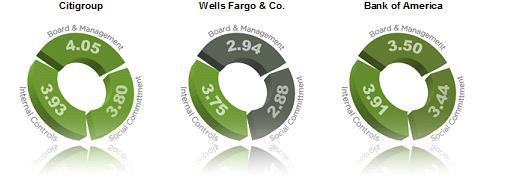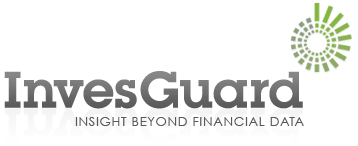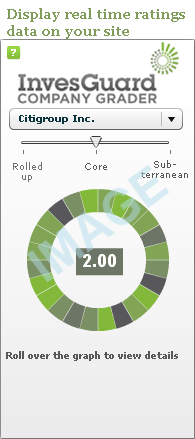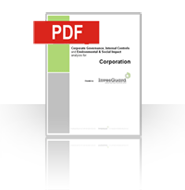-
Advantages of SubscriptionSubscription provides you the right to use all 3 levels of data.
The third and most detailed level of data which is available only to subscribers provides the most comprehensive explanation of the rating profile of companies in our database. It will provide you with information on why we think the Board Effectiveness of a company is weak or why the Audit Committee of a company can probably do better. This information may be that key element that you need over and above critical financial data to give you a complete corporate picture.
For additional information on why you should use InvesGuard please click here.
blog:
Guarding Investments one post at a time
Bar B’Que time for the House Financial Services Committee.
‘Grill baby grill’ is the mantra over at the House Financial Services Committee today. Dick Fuld (no introduction needed) and Thomas Cruickshank (ex chair of Lehman’s Board Audit Committee) are busy getting ‘marinated’ for their broiling session later today. Their testimony was made public yesterday, and I thought it may be worthwhile to examine Mr.Cruikshank's testimony considering that Dick Fuld’s testimony had already saturated the blogosphere enough without adding to the swarm.
Lets cut to the chase……Mr.Cruickshank’s testimony makes the entire (ex)Board of Lehman look like puppets…either in the hands of management or the auditors. On at least 4 different occasions Mr.Cruikshank claims the Board was “told” about things that they depended on. Now management is the primary source of information for the Board, but is that all the Board did ? Accepted whatever was “told” to them? Is this what the Board is for? To be “told” things? What is the true meaning of oversight?
Here are some more incongruous statements from his testimony-
"Since the beginning of 2007 through Lehman’s bankruptcy filing in September 2008, our Board and its committees convened on more than 80 occasions in that less than 21 month span. I still remember one week in July 2008, when we were examining and analyzing the company’s strategic options, meeting every day for six days in a row." – Great work, pat yourself on the back, but what about before 2007? Did they not meet as often before 2007?
"One issue that management spent a great deal of time discussing with the Board was risk." - And yet, it appears from his own testimony, that Risk Management was not on the Board agenda at all in 2007. It was discussed only in April 2008.
"Board members probed management, asked numerous questions and demanded and received detailed, cogent answers." – This I find hard to believe. Hopefully, the committee will ask for minutes of the meetings to support this assertion of Mr. Cruikshank.
“We also retained Ernst & Young (“E&Y”), one of the most highly-regarded accounting firms in the world, as the company’s auditors. E&Y performed reviews on a quarterly basis by applying analytical review procedures and making inquiries of persons responsible for financial and accounting matters.”- A big part of Analytical review procedures generally includes month to month or period to period comparison in which case Repo 105 transactions are not going to show up.
If the Board depended on E&Y’s ‘Analytical review procedures’ it is no wonder they were in the dark all this time.
“The Board was told how Lehman’s liquidity had, between the second quarter of 2007 and the second quarter of 2008, nearly doubled to a record high.”- Once again that troubling word “told” . Total absence of any apparent oversight.
“As the Examiner has concluded, this Repo 105 issue was never brought to the attention of the Board by anyone.” – Like someone is going to present a big time bomb to the Board and say here is a huge gaping governance hole. What do you think we should do about it?
A couple of times, Mr. Cruikshank quite skillfully passes the buck to the public accounting firm, Ernst & Young. “…I believe that E&Y would have promptly raised the issue with the Audit Committee and I would have expected them to do so. They did not.”
Mr.Cruikshank also laid bare his feelings on mark to market accounting - “…the firm’s real estate exposure (which was exacerbated by the rules for applying mark-to-market accounting)…”.
He ended his testimony by thanking all the other Lehman board members…including the “the first woman to command a U.S. naval station, and the head of the American Red Cross”. Great as their achievements maybe, it is hard to understand how a naval officer could possibly have understood and provided oversight over complicated financial transactions at Lehman. Many of the other directors had similar stellar personal backgrounds but almost zero financial industry experience.
And concluding his testimony was this blanket CYA, (Cover your a--) “While I may not have the knowledge and expertise of my fellow panelists appearing before this Committee…”- Short for, I don’t know anything, my eyes were shut, my ears were closed and my hands of course were stretched out to receive the easiest money I made in my life, so don’t ask me anythin’ about nothin’.
Tuesday
April 20
2009 Banking Industry Non Financial Scores - Citigroup, Wells, Bank of America
Lately, Citigroup appears to be putting its best foot forward. Its CEO provided a very confident (albeit doubtful) front during the recent congressional hearings held by the Oversight Panel for TARP. President and CEO of Citi Mortgage Mr. Sanjiv Das also appeared reasonably confident in Citi’s ability to ‘assist’ underwater homeowners in the recent House Financial Services Committee hearing.


It appears that these Citigroup executives are not too far from the mark…and not just based on their behavior or how confident they were at congressional hearings. Based on recent SEC filings and published information, Citigroup appears to have taken a lead over both Bank of America and Wells Fargo so far as InvesGuard's non financial scores are concerned.
Look at InvesGuard scores for Citigroup, Bank of America and Wells Fargo below:

A legend of the scores and what they mean has been included at the end of this post.
InvesGuard scores and grades companies based on non-financial information. Different parameters are considered including:
1. Number of transactions between the company and its directors (other than director fees) that may give rise to conflict of interest situations.
2. Directors who also perform consulting services for the company resulting into reduced Director Independence.
3. Level of transparency in Board Audit Committee reports.
4. Relevance of experience of Board members especially those who hold Board level finance, credit and risk committee positions in the financial industry.
5. A look at the quality of a company’s guidelines, charters, principles etc under which it operates.
6. Social and environmental factors such as lending practices, emissions, waste management, recycling etc.
For 2009, Citigroup’s chief area of improvement has been its Board of Directors. Although concerns continue over some aspects, the Citigroup Board is stronger than it used to be. Out of 9 parameters or ‘Core’ comparison events between Bank of America, Citigroup and Wells Fargo, Citigroup has scored the highest or shared the highest score for 7 of these ‘core’ events. These core events include such parameters like CEO and senior management effectiveness, aligned director shareholder interests etc.
Of the three companies, Wells Fargo has by far performed the worst on the Board of Directors and Senior Management front. Its poor scores will get even worse for 2010 with the jump in CEO and senior executive pay without any apparent long term strengthening of shareholder value. Hitting it the hardest, is Wells’ absence of a Board level Asset Quality committee. Even its Board level Finance and Credit committees appear to have some directors with less than relevant experience.
InvesGuard’s Internal Control Environment primarily includes a comprehensive review of a company’s Board Audit Committee including quality of this committee’s reports, its members, their compensation, as well as its charter. Conflict of Interest is also considered within the Internal Control Environment category.
For 2009, all three companies did not explicitly prevent their directors from providing consulting services to each of these companies. Providing consulting services has the potential to take away the independent perspective that directors are expected to provide. It could potentially cloud their judgement. In fact, Citigroup paid consulting fees of $100,000 to Director Joss during 2009 in addition to regular director compensation.
For more detailed information on these scores please visit our store at http://store.invesguard.com/ or send me an email at tejus@invesguard.com
Check back later this week when we will be adding final 2009 JP Morgan Chase and Goldman Sachs scores.
Legend for the scores used in the graphs

Monday
April 19





